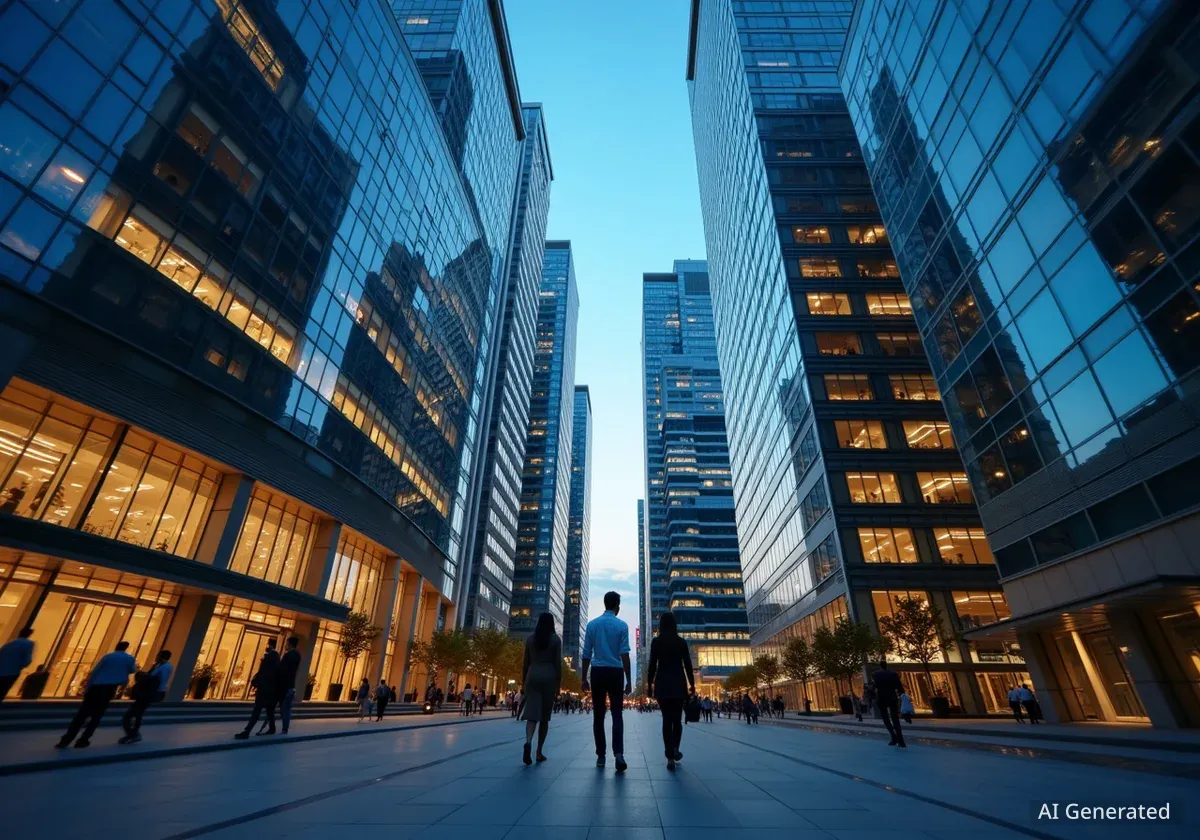Top executives from the real estate and hospitality sectors convened at the Forbes Global CEO Conference in Jakarta, sharing insights on the major forces shaping Asian property markets. Key discussions highlighted a significant office space boom in India, the surprising resilience of luxury retail in Hong Kong, and a worldwide surge in travel demand that is reshaping the hospitality industry.
Key Takeaways
- India's Office Market: Driven by global capability centers, India's office space absorption reached 39 million square feet in the first half of the year, with total inventory now exceeding one billion square feet.
- Hong Kong's Luxury Retail: Despite broader economic concerns, the city's high-end retail sector remains strong, supported by high-net-worth individuals and prompting major investment in property upgrades.
- Global Travel Surge: The hospitality industry is experiencing a sustained increase in demand as consumers prioritize travel experiences over purchasing luxury goods, a trend accelerated by post-pandemic behavior.
- Investment and Strategy: Leaders emphasized the dual importance of maintaining efficient cash flow while also pursuing ambitious, iconic development projects to ensure long-term value.
India's Commercial Real Estate Expansion
A major focus of the conference was the rapid growth in India's office property market. Irfan Razack, chairman of the Bangalore-based Prestige Group, detailed the strong demand fueling this expansion.
According to Razack, the primary driver is the establishment of global capability centers (GCCs). These are operational hubs set up by multinational corporations to handle functions such as software development, accounting, and back-office support.
India Office Market by the Numbers
In the first half of the year alone, India saw the consumption of 39 million square feet of office space. Razack noted that the country's total office space inventory has now surpassed the one billion square-foot milestone, indicating a mature and expanding market.
Prestige Group's Investment Plan
To capitalize on this trend, Prestige Group has outlined a significant investment strategy. Razack announced that the company plans to invest 120 billion rupees, equivalent to approximately $1.4 billion, into expanding its office portfolio.
This investment will add more than 17 million square feet of new office space across India. The goal is to increase the company's total office holdings to around 30 million square feet by April 2028.
Resilience in Hong Kong's High-End Market
While some markets face uncertainty, the luxury retail sector in Hong Kong is demonstrating notable strength. Michael T. Smith, chief executive of Hongkong Land, provided insights into this segment's performance.
Smith, whose company is a major commercial landlord in the city's Central business district, stated that despite subdued overall consumer sentiment, high-end retail continues to thrive. He described Hong Kong as a critical hub for high-net-worth individuals.
"We frequently get people to come into our mall in Hong Kong and spend $10 million a day shopping, which is pretty ridiculous," said Smith. "Hong Kong is at an inflection point now, and so we’re deploying capital there to ensure that we capture that."
In line with this outlook, Hongkong Land is moving forward with a $1 billion renovation of its luxury retail properties in the Central district. This investment signals strong confidence in the long-term viability of the city's high-end consumer market.
Hospitality Sector Sees Global Travel Boom
The global travel and tourism industry has entered a period of sustained growth. Anthony Capuano, the president and CEO of Marriott International, described the current environment as a "global explosion" in travel demand.
Shifting Consumer Priorities
Capuano attributed this trend to a systemic shift in consumer behavior, likely influenced by the Covid-19 pandemic lockdowns. He suggested that consumers now place a higher value on experiences like travel compared to material possessions.
"We see a sustained, systemic trend where more and more consumers... deeply missed the opportunity to explore the world," he explained. This behavioral change has directly benefited the hospitality giant.
Marriott's Financial Performance
The travel surge has translated into strong financial results for Marriott. The company reported a 4.3% year-on-year increase in its global revenue per available room (RevPAR), a key industry metric.
The growth was particularly pronounced in the Asia Pacific region, excluding China. In this area, which includes over 140 markets where Marriott operates, RevPAR saw a significant jump of 13% over the same period, leading all other regions.
Strategies for Navigating a Complex Market
The conference speakers also addressed the challenges of operating in an environment of geopolitical uncertainty and rising costs. They offered different but complementary perspectives on sound business strategy.
Focus on Financial Prudence
Lee Yeow Chor, who leads IOI Corp., a major landlord in Singapore, stressed the fundamental importance of cash flow efficiency. He advised that developers must carefully manage expenses, particularly the cost of land, which he identified as a major component of any project.
Lee explained that cash outflow begins the moment land is acquired, making disciplined financial management crucial from the very start of a development cycle.
The Value of Ambition
While agreeing on the need for financial discipline, Irfan Razack of Prestige Group added that developers should not shy away from ambitious projects. He argued that creating iconic and high-quality developments is a key strategy for long-term success.
"If you think big, if you look at excelling in whatever you’re doing and you’re trying to build some iconic developments, those will never fade away," Razack stated.
The Human Element in an AI Era
As technology, particularly artificial intelligence, becomes more integrated into business operations, leaders are considering its impact on the workforce. Anthony Capuano of Marriott shared his view on AI's role in the service-oriented hospitality industry.
He acknowledged that AI can improve efficiency but firmly believes it will not replace the need for human employees. "The unique challenge for our business is to remind ourselves that we are in the human connection business," Capuano said.
He recounted a question about whether a hotel could one day operate without any staff due to AI and robotics. His response was direct and unambiguous: "hell no." This highlights the enduring value placed on personal service and human interaction within the hospitality sector.





